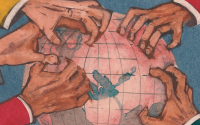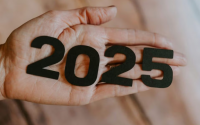23 August 2005Sean Penn
DAY TWO
After attending Friday prayer services in Tehran, Sean Penn, who visited Iran in June in the days before the country’s presidential election, prepares for a meeting with the son of a former president of Iran. Mehdi Rafsanjani was also a campaign director for his father.
We were sitting in Nayeb restaurant in central Tehran. I’d been holding a piss through the hours of prayer service. So after I ordered my lunch, I excused myself to the men’s room. “Men’s” was written in Farsi above, and “Manly” in English below. I stepped into the water closet, grateful to just have a piss. If I’d had more serious business there, it would’ve been a squat job with no hook for one’s jacket. Now, that would’ve been manly.
After lunch we had an appointment with Mehdi Rafsanjani, a campaign director and son of former President Ali Akbar Hashemi Rafsanjani. He’s an informal man. A little portly, he seemed almost amused at the opportunity not so much to answer our questions but to anticipate them. We spoke on a range of issues, from Iran’s nuclear intentions to the rights of women, the process of elections and the history of our two countries’ tension. In almost all cases, he referred our questions back to us. “You have less candidates than we do.” “You develop nuclear energy.” Norman Solomon took this one on. Referring to pockets of high cancer rates in the vicinity of our nuclear facilities, he conceded that perhaps we have made some mistakes. The young Rafsanjani responded, “We like your mistakes.” The issue of nuclear weapons brought an ironic smile to his face. “Why does the U.S. administration continue to pressure and pry into our business? It was the United States that made the chemical weapons used by the Iraqis against 10,000 people at Halabja.” (Only six weeks after the horrific events in Halabja, President Reagan sent his Middle East envoy, current Secretary of Defense Donald Rumsfeld, to deliver to Saddam Hussein the news that the United States had taken Iraq off its terrorist hot list. The meeting was sealed with the now infamous photograph of Rumsfeld and Hussein shaking hands.)
Currently, the United States holds $12 billion in Iranian assets frozen. And young Rafsanjani suggested the releasing of those funds might be a good first step for the United States in the normalization of relations with Iran.
Then he said something that really caught my ear. “There are four or five dissidents only who are currently in prison,” he said with disconcerting ease. “Even you, in the United States, have journalists in prison, probably the same amount, and some currently under threat. There are some human rights issues, then we have to solve that. In the United States, your Guardian Council are the rich. It is not so different.” In the days to come, the younger Rafsanjani’s words would be put to the test. He had posed a balance between Iranian treatment of free press and that in the United States. I chose to diligently consider this proposition, and was mindful of the cases against Matt Cooper and Judith Miller, and separately, the suspicious umbrella over Robert Novak back home. (Iranian law demands journalists reveal their sources upon government request. Our own 1972 Supreme Court decision effectively demands the same of journalists in the United States.) While the language of the court decision may have been gray, today Miller sits in jail for refusing to reveal a source. The information assault aimed at a high-profile visitor will keep you busy. Journalists seize the opportunity to chat you up with their Middle East expertise. If you’re not feeling chatty, they’ll write dismissive things about you in their columns and blogs. In all these things, the human ego affects information.
At the same time, I found myself approached with hundreds of opportunities for interviews with all those on the journalists’ circuit of interviewees. I was offered interviews over here, interviews over there. I was even contacted for a potential interview with former president and candidate Rafsanjani himself. But I was a little uninterested in most of it. Journalists spend so much of their time in pursuit of regurgitated information. Let’s talk to this one for that side, that one for this side. The analysts say there is a possibility of developing arms. The diplomats deny any interest in doing so. Some say it’s anti-Islamic. And other journalists back in the States read those quotes and paraphrase them or borrow them for their own articles. Offhand remarks by the “usual suspects” suddenly become unassailable fact. It adds up to a lot of print about the same thing; it makes you dizzy. You begin to lose your clarity, focusing entirely on the power establishment and losing the important story of any land: its people. Meanwhile, on the street, there are interesting rumblings about people who dared to challenge the official version of the truth.
Akbar Ganji, a heroic investigative journalist who at one time wrote columns implicating high-ranking individuals in assassination of dissidents, had disappeared two days before my arrival in Tehran. The talk on the street had him in prison or dead. Ganji had already spent 62 months behind bars on a term that began in April 2000 for expressing political views. (The following day, it would be revealed by Human Rights Watch that he had been taken back into solitary confinement at Tehran’s Evin prison, was barred from contact with family or lawyers and has taken to a life-threatening hunger strike.)
I put out the word that I would like to speak with Abbas Abdi, another prominent dissident who had been jailed two years for polling Iranians on relations toward the United States. I was told that in the uncertainty of the moment, and because of the disappearance of Ganji, Abdi was giving no interviews. I was starting to question, very seriously question, Mehdi Rafsanjani’s view of what represents a free press in Iran versus that in the United States.
In the late afternoon on Friday, following our meeting with Mehdi Rafsanjani, there was to be a rally at the primary campaign headquarters of the elder Rafsanjani in Elahiyeh, on the north (and rich) side of Tehran, in the highlands. Some outdoor cafes, nice cars, posh houses. We drove through the congested city some 40 minutes to the foothills that are Elahiyeh. We pulled over beside a cafe and went inside.
It was a little, bohemian-looking place, but still clean and upscale. So was the crowd. Three women sat at the table behind us. We asked if they would talk to us about the election. They were happy to talk, but not so much about the election. They didn’t intend to vote. Seemed like a sham to them. Women count as one-half a man in this country. Insurance benefits are half. Death benefits, called diyeh, half. And in the “he said — she said” weight of testimony in a criminal case, half. Guess who wins that verdict? The disappointments of the Mohammad Khatami regime had created a lot of this. “Nothing happened and nothing will happen. We have zero sense of hope in the election,” one of the women, a 31-year-old Arabic instructor, told us. “Khatami promised us some freedoms,” she said. “I can’t even get any in my house. I can’t even have satellite television. They are playing with us.”
We were briefly joined by a man from an adjacent table. He offered, “This country was in a state of mourning after the Iraq-Iran war. We lost an entire generation of Iranians. One million people were killed. You cannot forget these things if you aim to understand our country.” And I did understand it in this context: The United States lost 58,000 men in combat in Vietnam. Our population at that time was roughly 220 million, so the casualties were approximately .026 percent of the entire population. And yet we all feel wounds of that war to this day. I imagined what it must have been like for Iran to have lost one in every 50 people in the country, a full 2 percent of the total population wiped out in an eight-year war. He went on, and in describing the evening following the Iranian soccer team’s victory over Bahrain, said, “You should’ve seen it. I did not think my people could be happy like this again.” (The celebrating on the streets of Tehran that night was so buoyant and large that police allowed women to take off their scarves, and there were even reports of open drinking. The celebration and police tolerance ended at 6a.m. the following day.) The young man thanked us for listening and returned to his cappuccino.
Two of the women lived together. It seemed that they might have been insinuating that they were a lesbian couple, but I can’t say for sure. I refer to my internal manual of ethics, and there it is right there, in “questions unbecoming a gentleman”: Don’t ask two women you just met if they’re lesbians. I’m big on prudish restraint. Yet without asking, they do make it clear that their holing up together is frowned upon by their families and society alike. A single woman may live with her parents, perhaps on her own if she is able, but with another single young woman, everybody’s back gets itchy. Yet, whatever the private truth of these two women, “sexual freedom” would make for a difficult movement to mount, as even uttering those two words together is against religious law in the Iranian republic.
At some point in the conversation, a man somewhere in his early 40s, wearing a dark pinstriped suit, stepped over to my companion Reese Erlich and whispered something in his ear. When the man returned to his window-side table, we thanked the women for their time, and they returned to their table. “What did that guy want, Reese?” I ask. Turns out that fellow had recognized my face. Seemed to feel he could set up an audience with Hassan Khomeini, grandson of the late Ayatollah Khomeini, the one whose image was staring at me everywhere I went. He said he could also facilitate an interview with Mehdi’s father, Ali Akbar Hashemi Rafsanjani.
While I have said there is a great warmth toward Americans, it’s never far from your mind that you’re one bedside book in the toilet away from death. One handshake with a woman away from jail. A visitor is subject to all the laws of the Islamic Republic of Iran and all its thinly veiled oppression. And less thinly veiled restriction on the press. It’s like dancing on a volcano. So, who was this “Star Wars” Sith? And why did he want to give us his connections? We were wary, to say the least. He’d given Reese a phone number, and, after we left the cafe, we shared our thoughts and concerns.
Of course, we wanted the interviews if we could get them. These were two major figures, one of whom, it appeared at the time, was likely to be returned to a presidency he’d relinquished in 1997. But we wanted to be careful not to be led into something by one, and there are many, of those who, for their own purposes, would design circumstances simply to create a sense of Iran as an unstable place. We called the cell number, and the gentleman was strangely pushy. We told him we couldn’t do it immediately. He said he could come to our hotel at 10:30 p.m., and Iran he and some others would pick us up and take us to the interview with Khomeini. When we said we had our own car and driver, he pursued, saying, “Oh, it’ll just be easier. This way you won’t get lost.” Reese told him he’d call him back, and filled us in.
We decided that if he really had the pull that he claimed, perhaps he would have it in the daylight of the following day. So once again, we called back the man in the suit and gave him a window of daylight hours the following day, when we would be able to make time for the interviews. And added that we would drive ourselves. It had also been requested that our translator not accompany us. He assured us that they had fully capable translators of their own. Why was I seeing knives in my head? Later that evening, the stranger returned our call, saying the meeting had been set for 3 o’clock the following afternoon; we could come in our own car to the well-known estate of the late Ayatollah Khomeini for an audience with Hassan. The meeting with Rafsanjani would take place the following day.
Saturday morning. We headed off to the grand bazaar in the southern end of the city. Its covered shopping alleys spread over nearly a five-mile area. There are several mosques, but it primarily serves as a place of commerce, a shopping mall with history. Men pushed newly woven Persian rugs through the crowds on trolleys. Stores sell ceramics, silver, electronic equipment, lingerie. There are great corridors of tile and brick ceilings. There are goldsmiths, bridal shops, figurine parlors. At the entrance, there is even a bookseller featuring biographies of President Bush and Sen. Hillary Clinton.
The bazaar was crowded, loud and pungent. I knew that it had been an economic power center throughout its history. Being a merchant and being part of the body politic were one and the same. One of the mosques serves as a paramilitary training center for the Baseej, (a volunteer militia affiliated with Ansar-e-Hizbollah, the Iranian wing of its Lebanese Shiite base,) whose thugs make it their business to control social freedom and enforce their view of Islamic morality, participating in everything from the beating of young couples for unlawful contact to the international assassinations of dissidents. Here they are. The radical right’s muscle, who answer only to the office of the supreme leader Ayatollah Ali Khamenei. Their bazaar chapter is 5,000 strong, and uniformed police defer to their authority.
On my first trip to Baghdad, prior to the war, it was easy to see the effect of U.S. sanctions. Sadly but not surprisingly, when I returned to Baghdad during what had become the guerrilla war (writing for The Chronicle: Part 1 Jan. 14, 2004, Part 2 Jan. 15, 2004), things had only gotten worse. There had been many debates regarding the effectiveness of sanctions. From my observations, the historical effect of sanctions is to leave the people of a country paying the greatest price. There’s no question that Hussein pillaged benefits intended for his people and that that additionally contributed to the destitution of his country. Nonetheless, the sanctions on Iraq were strict and made obtaining standard goods difficult and often impossible. That is not the case in Iran. Iran is a rich country. And the sanctions imposed on it by the United States do not limit access to American or international goods, except to those unable to afford it. If you want a Mercedes Benz, it comes through the middleman in Dubai. If you want Frosted Flakes — from Turkey. Heroin, of course — that’s Afghanistan, and represents a significant problem in this dry Islamic state. I saw these goods in Tehran as commonly as one might in Des Moines. As I write these notes, I’m drinking a Coca-Cola from the Brazilian subsidiary of that American company. So as not to implicate anyone, I’ll only say this about alcohol: I found it. It was easy to find and tasted just as good as it does here at home. .
Tomorrow: A meeting with the grandson of Ayatollah Khomeini.
For better and worse, U.S. is a role modelWith his family fortune rooted in the pistachio business and his father the country's former president, Mehdi Rafsanjani is a man who is comfortable with power. He uses that sense of his family's influence well, with charm and finesse. When we pressed him on the question of what Iran does with its radioactive waste, his only response was, "Well, America does it."
Not only is "America does it" a blind justification for harassment, fingerprinting and nuclear technology in Iran, it is also rooted in the culture of the country as a kind of aspiration. There is a love for our nation that is palpable on the street. There is a deep desire for our respect in return. And this seems very crucial to the psychology of Iranian politics, both hard-line and reformist. For all of the bad blood between our nations, you can't help observing that Iranians also love us, and what they know of America. I'm not talking now of the minority militant bastions of hatred but, in my limited experience, of Iranians in general.
This is a country where over half the population is under 26 and, given a chance, would indeed move their nation toward a more secular democracy. It isn't just their declarations of love toward this traveling American. There is proof of it in their knowledge and excitement about our country. This interest was not created for my benefit. It was there when I arrived. Yet if the United States continues to pursue inflammatory rhetoric, like the "Axis of Evil," or worse, increased sanctions and potentially unjustified military action, you can't help wondering if it may move a heterogeneous country, well on its way to new ideas and pursuits of freedoms, into a homogenous monolith of hatred. While the regime's behavior has been suspicious, Iran consistently claims compliance with the Nuclear Non-Proliferation Treaty (of which it is signatory), and the International Atomic Energy Agency seems to concur. Any reckless action on the part of the United States or Israel may lead to Iran dropping out of the treaty. For the moment, Iran's greatest concern is a possible Israeli attack on Natanz or Bushehr, its primary nuclear facilities. (It should be noted that only weeks prior to its inclusion in the Axis of Evil, Iran invested $560 million in support of U.S. actions in conjunction with pro- Iranian Afghans against a declared, mutual enemy in the Taliban.)
-- Sean Penn
Sean Penn is an Oscar-winning actor and director who lives with his family in the Bay Area. He previously reported on his trip to Iraq for The Chronicle
http://sfgate.com/cgi-bin/article.cgi?f=/c/a/2005/08/23/DDGVUEAQRL1.DTL






